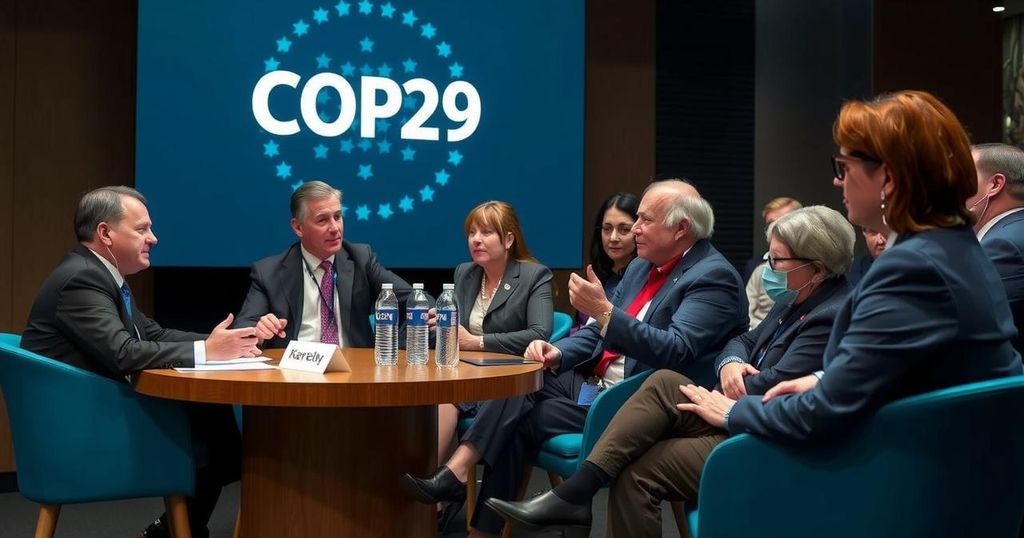Urgent Call to Action at COP29 as Leaders Clash Over Climate Strategy

At COP29 in Azerbaijan, a new report emphasized the need for urgent action against rising global carbon emissions, with leaders divided in their approaches. The report indicated that net-zero CO2 emissions are now necessary by the late 2030s to meet climate targets. Negotiations included financial commitments to aid developing countries in their climate adaptation efforts, amid a backdrop of geopolitical tensions affecting potential agreements.
At the UN-led COP29 talks in Azerbaijan, global leaders expressed conflicting approaches to addressing climate change amid alarming new findings. A report from the Global Carbon Project indicated that carbon dioxide emissions from fossil fuels have reached unprecedented levels. It emphasized that to adhere to the Paris Agreement’s goal of limiting global warming to 1.5 degrees Celsius, net-zero CO2 emissions must be achieved by the late 2030s, far sooner than the previously projected 2050 deadline. The urgency of the situation was echoed by Azerbaijan’s lead negotiator, Yalchin Rafiyev, who stated, “The time window is narrowing, shrinking — and we need to act urgently.” Meanwhile, some delegates defended fossil fuels, illustrating a stark divide among leaders regarding the best path forward. Leaders from countries facing significant climate consequences implored for immediate action to phase out fossil fuels. The discussions included a draft proposal focusing on financial commitments to assist developing nations in their transition to cleaner energy. A predominant demand from those nations is for wealthy countries to pledge at least $1.3 trillion annually, a stark increase from the current $100 billion. Calls for increased funding were challenged by geopolitical realities that complicate potential commitments to climate finance. Furthermore, comments from leaders highlighted the perceived inaction of some nations in addressing climate challenges. Italian Prime Minister Giorgia Meloni advocated for a more balanced approach that does not place decarbonization at the forefront of sustainability. Contrastingly, Pacific island nations, represented by Tuvalu’s Prime Minister Feleti Penitala Teo, emphasized the limited time left for effective action, asserting that “there is simply no time to waste.”
The global climate crisis continues to escalate, prompting international discussions aimed at curbing climate change impacts. COP29 is a pivotal moment for nations to establish financial commitments to support adaptation and clean energy initiatives, particularly for vulnerable countries facing severe climate threats. Recent scholarly research underscores the need for a more urgent approach to emission reductions, crucial for meeting the Paris Agreement targets. The ongoing divergence in geopolitical interests complicates collaborative efforts to address urgent climate challenges.
In conclusion, COP29 has highlighted the urgent need for decisive action against climate change, reinforced by alarming data on rising carbon emissions. While some leaders advocate for a more gradual approach to fossil fuel dependency, others emphasize the critical need for immediate transitions and financial support for developing nations. The discussions at this summit underscore a significant divide among countries, complicating efforts to unite behind a common climate action framework, ultimately impacting the global commitment to combat climate change.
Original Source: www.rfi.fr








